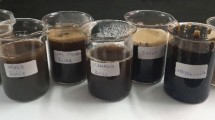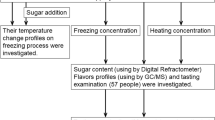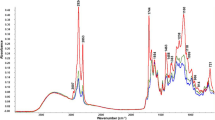Abstract
THE investigation of the effect of caramelized fructose on the stability of l-ascorbic acid was suggested by the demonstration that caramelization of lemonade powders at high storage temperatures was due to fructose which was formed from sucrose by hydrolysis, made possible by the liberation of water of crystallization of citric acid1; and also by the fact that a darkening of colour and a loss of ascorbic acid are associated changes in orange juice concentrate, although the relationship between the two processes is by no means clear.
This is a preview of subscription content, access via your institution
Access options
Subscribe to this journal
Receive 51 print issues and online access
$199.00 per year
only $3.90 per issue
Buy this article
- Purchase on Springer Link
- Instant access to full article PDF
Prices may be subject to local taxes which are calculated during checkout
Similar content being viewed by others
References
Isaac, Wm. Edwyn, "Storage of Synthetic Citrus Powders", Ind. Eng. Chem., 35, 470 (1943).
Harris, L. J., Nature, 132, 27 (1933).
Author information
Authors and Affiliations
Rights and permissions
About this article
Cite this article
ISAAC, W. Effect of Caramelized Fructose on the Stability of l-Ascorbic Acid. Nature 154, 269–270 (1944). https://doi.org/10.1038/154269a0
Issue Date:
DOI: https://doi.org/10.1038/154269a0
Comments
By submitting a comment you agree to abide by our Terms and Community Guidelines. If you find something abusive or that does not comply with our terms or guidelines please flag it as inappropriate.



